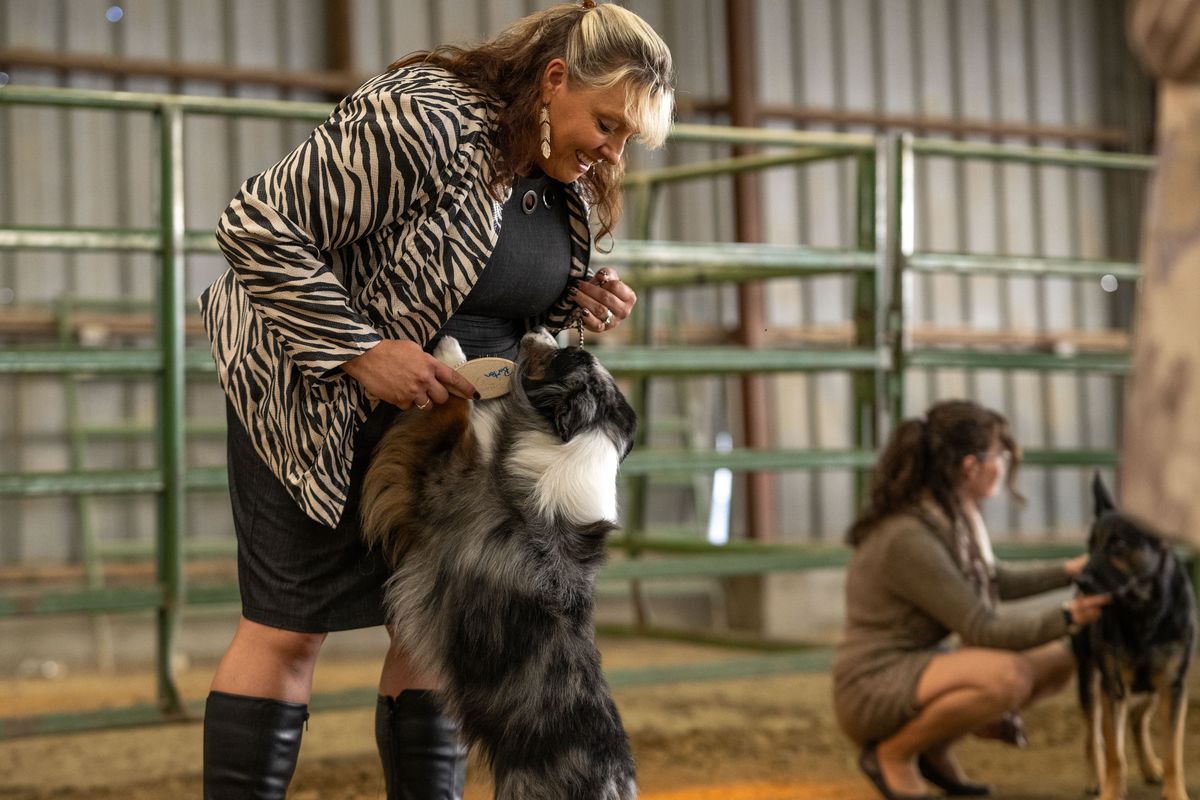100 dogs put their best paws forward at Spokane Valley dog show

From Great Danes to Pomeranians, around 100 dogs strutted their stuff at a Spokane Valley dog show this weekend.
Dogs and their exhibitors visited the Spokane County Fair and Expo Center to compete at the International All Breed Canine Association Spokane Valley Sieger dog show.
Coats groomed to perfection and catching the breeze, dogs of all breeds pranced around the show ring at the fairgrounds for several judges with international acclaim.
Judges evaluate the dogs based on a specific set of standards special to each breed, outlining what the “perfect” pooch looks like.
“The judges know that standard, and they’re looking at the dog and they’re commenting, say, the eyes meet the written standard or the coat texture, if it’s coarse and it’s a terrier, like it’s supposed to be,” said Greg Wessel, superintendent of the dog show who hails from Fort Wayne, Indiana. “So whatever the uniqueness of that breed, the judges are commenting on it.”
For judge Terill Udenberg, of Vernon, British Columbia, each dog is held to standards relating to their “form and function,” he said. Form has to do with their physical attributes, while foundation pertains to how well they would fulfill the initial functions of their breed. He’d evaluate a dog in the herding group, like a collie, different from a toy dog like a pug.
“The standards are based on those foundations,” Udenberg said. “You have to know the history of the breed.”
Despite written standards and several trainings and courses judges complete, it’s still a “subjective sport” where each judge has their weakness: a breed they’re biased towards. There’s also subjectivity in evaluating something that can’t be bred.
“What that extra thing is is just a presence,” said judge Susan Quesnel, of Falkland, British Columbia. “It’s not showy, necessarily, or a wagging of the tail, it’s just self -confidence.”
Unique to this association’s dog shows, exhibitors receive written critiques about their dogs, with judges’ evaluations in several categories like condition, body structure and expression.
Not used to the feedback, exhibitor Jordan Cartwright said the reviews of her 3-year-old dalmatian, Klassic, were “eye-opening.” Cartwright has grown a thick skin after years of showing dalmatians, even competing in the Westminster Kennel Club Show. Regardless of feedback heard or unheard, Cartwright’s affection is unwavering towards her brown-spotted pup.
“This judge thinks this about my dog, and I’m like, ‘OK, they can think that.’ But I still love my dog,” Cartwright said. “I think that takes years of experience. It is interesting getting inside the judges’ heads.”
Cartwright began competing with dogs after she got her first dalmatian, a show dog that made her fall in love with the sport.
“He won a lot; he won two Westminsters, so he took me to all the places,” Cartwright said. “After him, I kind of got hooked.”
Not only was she hooked on competing, but she was hooked on the breed itself. They’re smart, energetic, but can also be a “brat,” at certain times, Cartwright said. Her two dalmatians have different personalities: Klassic is more outgoing, while her brother can be defensive when needed.
Cartwright’s dalmatians have been by her side from apartments to backyards to dog shows.
“They were just super adaptable to all of my life changes that I had,” Cartwright said.
It was 9-year-old French bulldog Neptune’s final show. With graying hairs growing on his chin and a little less spring in his step than some competitors, exhibitor Laura Hammond gave it one “last hurrah,” before the veteran’s retirement.
“I’m just really proud of him,” Hammond said, beaming at Neptune. He earned a ribbon in Sunday’s dog show, his first title from this association, though he’s well decorated in American Kennel Club events after a lifetime of competing.
His full title reflects his success he’s dubbed Grand Champion Bronze Gold Sierra Neptune, though Hammond’s grandkids just call him “Neppy” or “Old Man.”
He’s hanging up his competition collar, but Neptune is surrounded by adoration. He won’t have to look far for attention in his retirement years.
“My grandkids adore him,” Hammond said. “My kids, they’re always jealous of him, saying, ‘Oh, he’s the third child.’ ”